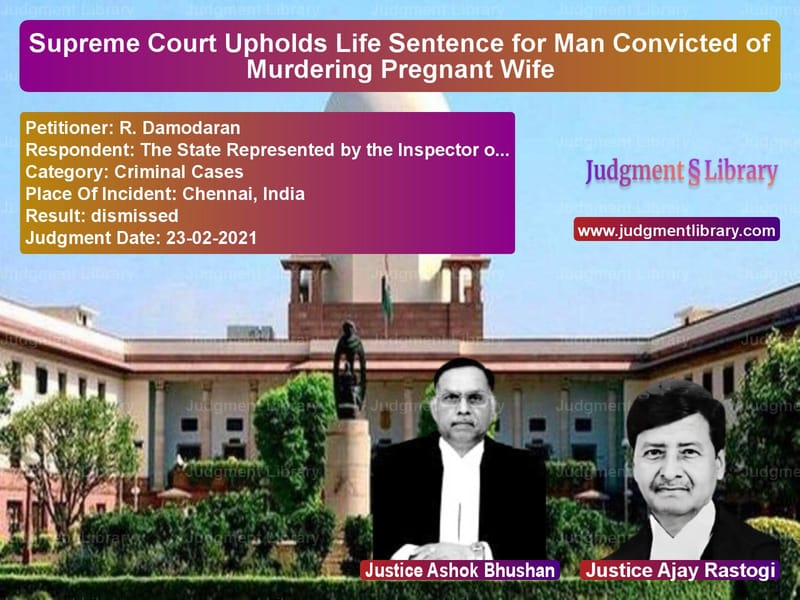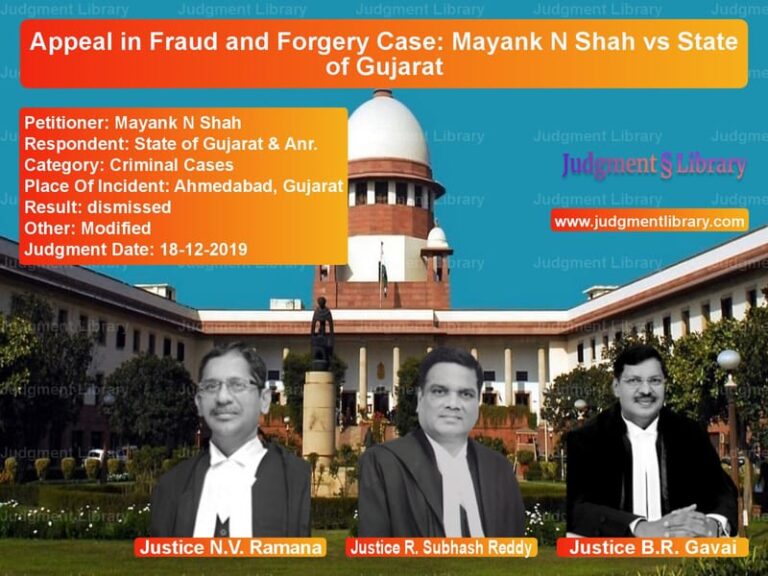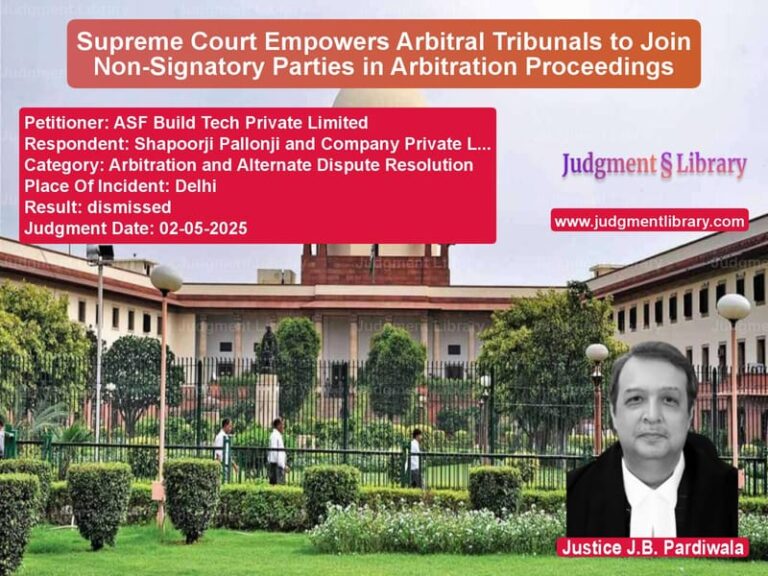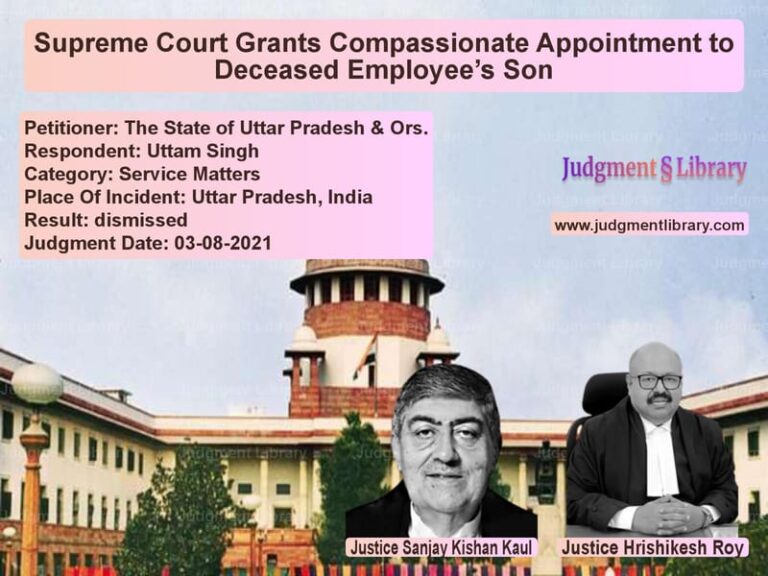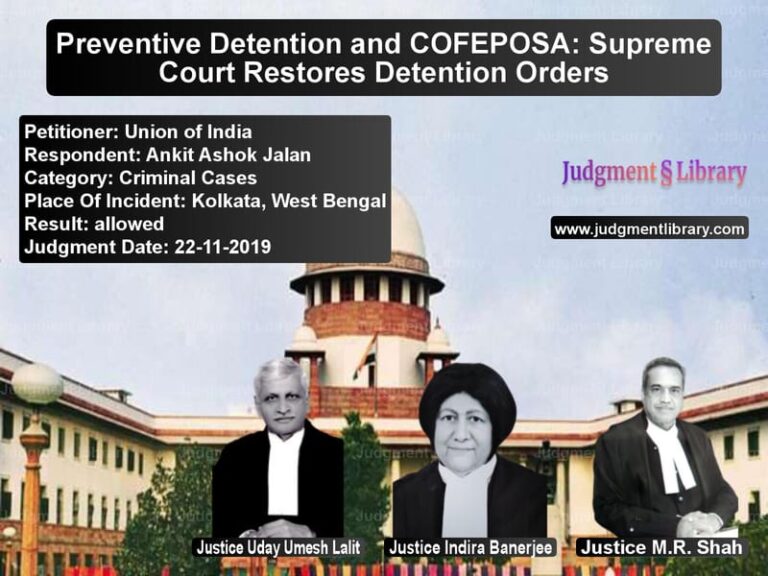Supreme Court Upholds Life Sentence for Man Convicted of Murdering Pregnant Wife
The Supreme Court of India recently delivered a landmark judgment in the case of R. Damodaran vs. The State Represented by the Inspector of Police, upholding the conviction and life sentence of a man found guilty of murdering his wife, who was in an advanced stage of pregnancy. The Court dismissed the appeal filed by the accused, reinforcing the principles of justice in cases involving domestic violence and spousal abuse.
The judgment was delivered by a bench comprising Justices Ashok Bhushan and Ajay Rastogi. The Court reaffirmed that circumstantial evidence, when strong and conclusive, can establish guilt beyond a reasonable doubt.
Background of the Case
Marital Abuse and Dowry Demands
The appellant, R. Damodaran, was married to Nirmala Mary on February 17, 1997. From the early days of marriage, he subjected her to physical abuse and financial exploitation. He frequently changed rented accommodations and demanded money from her father, who assisted them financially to the extent possible.
Violence Leading to the Tragic Incident
After moving to Walles Garden, Chennai, the accused regularly came home intoxicated and physically assaulted his wife. On the night of October 28, 2005, a violent altercation ensued, during which he picked up a wooden log and struck Nirmala Mary, inflicting severe injuries on her abdomen.
Discovery of the Crime
The following morning, on October 29, 2005, the victim’s aunt, Mrs. Glory (PW-2), found her standing outside, visibly injured. When questioned, she revealed that her husband had assaulted her with a wooden log. Later that day, the appellant took Nirmala Mary to Kilpauk Medical College and Hospital, falsely claiming that she had suffered a cardiac arrest. However, the doctors pronounced her dead on arrival.
Medical and Police Investigation
The medical examination confirmed that the victim had died from shock and hemorrhage due to thoracic injuries. The Sub-Inspector of Police (PW-8) initially registered an FIR under Section 174 of the Criminal Procedure Code (CrPC) for suspicious death. However, after reviewing the post-mortem report, the police reclassified the case under Section 302 IPC (Murder).
Supreme Court’s Observations and Ruling
Circumstantial Evidence and Guilt
The Supreme Court noted that there was no direct eyewitness to the crime but emphasized the strength of the circumstantial evidence. The Court observed:
“The chain of circumstantial evidence is complete, leaving no room for doubt that the accused caused the death of his wife through intentional and brutal assault.”
Medical Evidence Corroboration
The post-mortem report revealed the following injuries:
- Severe internal bleeding in the thoracic cavity (1100 grams of clotted blood).
- Fractures in the 5th and 6th ribs on the left side.
- Laceration of the lower lobe of the left lung.
- Bruising and hemorrhage in the left temporal region.
The forensic expert (PW-7) testified that the injuries were caused by blunt force trauma and could not be self-inflicted.
False Defense of Cardiac Arrest
The appellant claimed that his wife had suffered a cardiac arrest, but this argument was dismantled by the forensic evidence. The Court remarked:
“The attempt to mislead the doctors and police by falsely attributing death to cardiac arrest only strengthens the prosecution’s case.”
Past Incidents of Abuse
Police officers (PWs 9 and 10) testified that the deceased had previously lodged complaints against her husband for domestic violence. The history of abuse further supported the prosecution’s case.
Legal Principles in Circumstantial Evidence Cases
The Supreme Court reaffirmed the principles of circumstantial evidence as laid down in Sharad Birdhichand Sarda vs. State of Maharashtra (1984) 4 SCC 116, which requires:
- A complete chain of evidence leading to the sole conclusion of the accused’s guilt.
- The evidence to be conclusive and inconsistent with any hypothesis of innocence.
- No missing links in the chain of circumstances.
The Court held that the prosecution met these standards, making the conviction legally sound.
Final Judgment
- The Supreme Court dismissed the appeal and upheld the life imprisonment sentence imposed by the Trial Court and confirmed by the High Court.
- The appellant was directed to surrender within four weeks to serve the remaining sentence.
Key Takeaways from the Judgment
- Domestic violence leading to fatality warrants severe punishment.
- Circumstantial evidence can conclusively establish guilt when properly linked.
- False defenses and misleading statements further incriminate the accused.
- Judicial intervention is critical in ensuring justice for victims of spousal abuse.
- Medical and forensic evidence play a crucial role in murder trials.
Impact of the Judgment
This ruling sends a strong message against domestic violence and reinforces the legal protections available to victims. It highlights the role of forensic evidence in establishing guilt and underscores the importance of a well-structured investigation.
Conclusion
The Supreme Court’s judgment in R. Damodaran vs. The State Represented by the Inspector of Police serves as a landmark ruling in cases involving spousal abuse and homicide. By upholding the conviction and life sentence, the Court reaffirmed the importance of protecting victims of domestic violence and ensuring justice through a strong evidentiary framework.
Petitioner Name: R. Damodaran.Respondent Name: The State Represented by the Inspector of Police.Judgment By: Justice Ashok Bhushan, Justice Ajay Rastogi.Place Of Incident: Chennai, India.Judgment Date: 23-02-2021.
Don’t miss out on the full details! Download the complete judgment in PDF format below and gain valuable insights instantly!
Download Judgment: r.-damodaran-vs-the-state-represente-supreme-court-of-india-judgment-dated-23-02-2021.pdf
Directly Download Judgment: Directly download this Judgment
See all petitions in Murder Cases
See all petitions in Domestic Violence
See all petitions in Attempt to Murder Cases
See all petitions in Judgment by Ashok Bhushan
See all petitions in Judgment by Ajay Rastogi
See all petitions in dismissed
See all petitions in supreme court of India judgments February 2021
See all petitions in 2021 judgments
See all posts in Criminal Cases Category
See all allowed petitions in Criminal Cases Category
See all Dismissed petitions in Criminal Cases Category
See all partially allowed petitions in Criminal Cases Category

